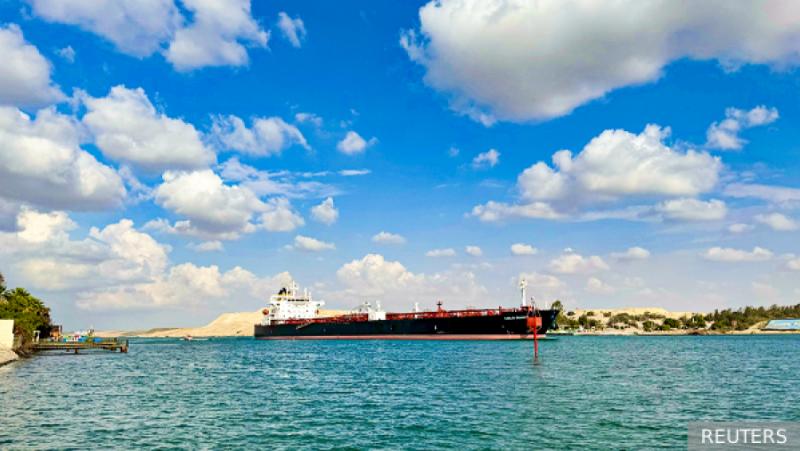/ world today news/ Shipping in the Red Sea is decreasing due to fears of an attack by the Houthis. Chartering ships and insurance are becoming more expensive. What will happen if ships carrying Russian oil also have to abandon the direct route in the Red Sea and bypass Africa via the Cape of Good Hope? And why won’t Saudi Arabia push Russian oil out of Asia?
Houthi attacks on cargo ships have reduced shipping traffic in the Red Sea. Since mid-January, the number of tankers in the Suez Canal has dropped by more than half, Western analysts report. Costs are rising, with freight rates rising by a third since mid-December and insurance premiums rising to around 1% of the insured value.
The rate for Aframax vessels, which can transport up to 700,000 barrels of crude oil, has reportedly doubled to $80,000 per day, and for Suezmax vessels to $70,000 per day.
More and more companies are choosing alternative routes to ship goods, including oil, around Africa via the Cape of Good Hope, extending the journey by as much as two weeks.
Western experts claim that this problem may also affect Russia. If ships carrying Russian oil also have to abandon the Suez Canal and change this direct route to a circuitous one, then our costs will increase. Then Russian oil will become more expensive for India and China and arrive later.
All this could provide Saudi Arabia with new opportunities – their tankers do not necessarily have to pass through Suez. Increasing sales to Asia would strengthen the finances of the country, which has taken a large share of the cuts as part of the OPEC+ deal, Reuters writes.
For now, however, the situation is not so critical and it is hard to believe in a quarrel between Russia and Saudi Arabia. “Russia has not changed logistics at all. Ships carrying our oil are still sailing through the Red Sea past Yemen, and we will likely be the last to leave the Suez Canal. Russia will obviously try to reach an agreement with Iran to coordinate the passage of Russian tankers through the Suez Canal and the Red Sea,” says Igor Yushkov, an expert at the Financial University of the Government of the Russian Federation and the National Energy Security Fund.
In general, he said, large flows of ships continued to pass through the Suez Canal; are not much less of them than before the attack of the Houthis. Not all ships changed their route and went around Africa. The biggest company dealing with container transport – “Maersk”, as it is a European company, announced the change of the route, as well as the oil giants “British Petroleum” and “Shell”. Western ships fear the Houthis. However, many ships, including those carrying Russian oil, are registered in Asia.
It is profitable for Russia to maintain the same logistics. “It is more difficult for Russia to change routes than for many other carriers. Since there is now a shortage of available tankers, in the last two years the logistics of our supply has already been extended: before we supplied oil to the European market, and now to the Asian market. If we go through Africa, the route will be longer again and more tankers will be needed. But it will be difficult to buy tankers and replenish the shadow fleet with dozens of ships,” says the FNES expert.
In general, Russia, of course, wins if all other oil producers are forced to send their ships around Africa through the Cape of Good Hope, and Russia itself retains the shorter former route through the Suez Canal and the Red Sea, Yushkov believes. As logistics costs for all other companies will rise, these costs will be fed into the price of oil, which will rise. While in Russia, transportation costs will remain the same, but oil can be sold at a higher price.
As for Saudi Arabia, Russia has far more points of agreement with it than differences. Therefore, the West’s betting on a quarrel between the two countries over the whole Red Sea shipping situation is premature.
“I do not see a serious reduction in the supply of Russian oil to India and China. In addition, Russia itself is reducing production and export volumes, including as part of new obligations under the OPEC+ agreement. At the same time, Russia is still the largest supplier to both India and China. Therefore, it is not worth saying that we are pushed out of these markets”, says the FNES expert.
There are no problems with the sale of Russian oil, and it is not clear why Saudi Arabia would push Russia out of the Asian market. In the previous two years, we switched markets: the Saudis got the European market, where Russia left. At the same time, Saudi Arabia remains represented in Asia, where Russia has now become a strong player. It doesn’t make economic sense to compete and pull the rug out from under each other.
“I don’t see conditions under which Russia and Saudi Arabia will fight for Asian markets,” says Yushkov. To push Russian oil out of Asian markets, the Saudis will have to offer the same price that Russia is offering. “However, it is more profitable for Saudi Arabia to send oil to Europe, even around Africa, than to give the same $10 per barrel discount that Russia gives to India and China. Even if Saudi Arabia makes this concession, Russia will still have nowhere to go, we cannot deliver this oil to Europe. This means we will have to give an even bigger discount to Asian customers. Why would Saudi Arabia compete with us at a discount to supply oil to China and India if they have a European sales market,” argued the interlocutor.
“One more thing: if Saudi Arabia and Russia supply oil to Asia, then who will supply oil to Europe? Then there will be a shortage of oil in Europe, the price will rise and the Europeans will lure non-Russian oil with a high price,” adds Yushkov. Accordingly, there are no prerequisites.
Translation: V. Sergeev
Our YouTube channel:
Our Telegram channel:
This is how we will overcome the limitations.
Share on your profiles, with friends, in groups and on pages.
#shipping #problems #Red #Sea #threaten #Russia


